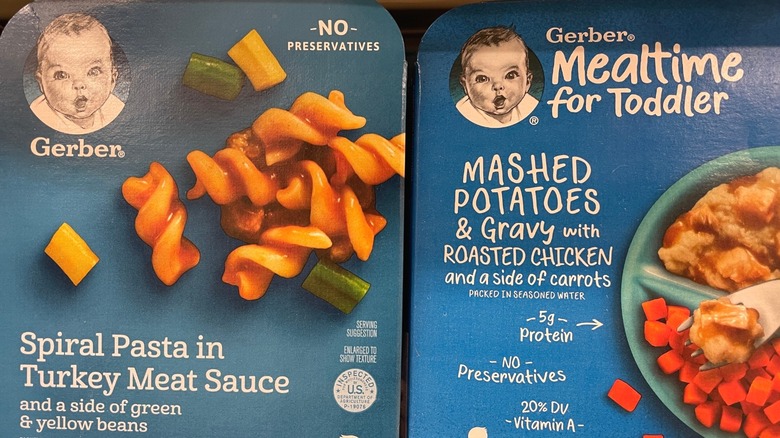Gerber Singles Was The Baby Food Made For Adults. Why Didn't It Last?
Unless you're a parent, Gerber is a brand you likely haven't thought about in quite some time. They peddle mashed-up fruit for babies, as well as slightly more solid food for slightly older babies. (As an interesting aside, you can use Gerber's mixes to make a cake.) They're advertised with a charcoal drawing of a cherubic youngster, who — despite the rumors — is not Humphrey Bogart. (In fact, the original model was Ann Turner Cook.) But if Gerber had its way in the 1970s, adults across the United States would be happily eating Gerber Singles, ready-to-eat baby food for the mature palate. In a decade when weird food reigned supreme, Gerber Singles proved to be a step too far and failed for just about every reason you can think of.
See, in the '70s, Gerber had a problem. The post-war "baby boom" had finally waned, leading to a "baby bust." More people than ever were living single, and they weren't necessarily in a hurry to settle down and start a family. That's bad news if you're a company selling baby food, and Gerber felt the need to pivot. Why not target these young, footloose, and fancy-free single people by offering them tasty, ready-to-eat meals in a glass jar? All they had to do was spoon it up, and they could go back to whatever vintage synth was occupying their attention at the time.
Gerber Singles never found success
Gerber offered plenty of different flavors for the adult palate, including a take on sweet and sour pork and turkey Mornay. In fairness, there are some conceivable uses for a cheap, easy, flavorful food you can down within minutes; White House reporter Hallie Jackson once admitted she ate baby food regularly because of its convenience. However, Gerber could not tap into this nascent market and Gerber Singles was an embarrassing failure from the start.
The ad campaign was partly to blame: One tagline said that it was food for "whenever you eat alone," which suggests that eating Gerber Singles was a lonely act for lonely people. It brings to mind a sad bachelor hunched over in the corner of his dingy apartment, shoveling meat purée into his mouth. Gerber's other attempts also failed to get the young, hip singles of the '70s to chow down on what was essentially grown-up baby food. "Look at you! All grown up!" one ad tagline gushed like a patronizing auntie pinching your cheek. "It was good for you then, it's good for you now," said another, once again reminding people of what they were eating. Thanks to taglines like these, all types of Gerber Singles were taken off the market within months.

